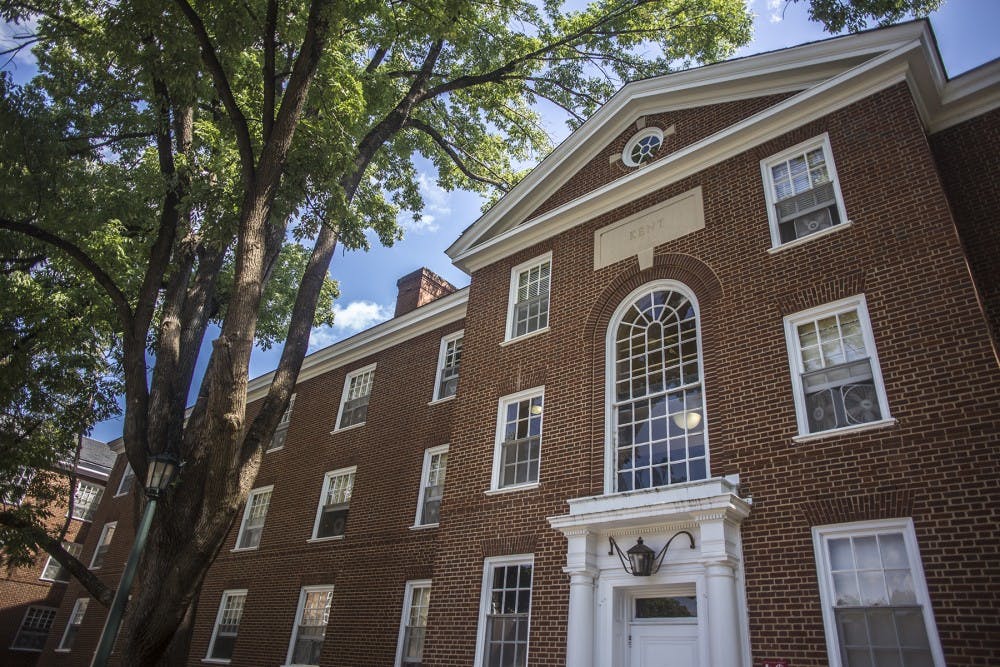This past Sunday, several resident advisors took steps to address racial slurs that appeared in first-year dorms.
On Sept. 2, residents and resident advisors of the Kent-Dabney Dorm Association discovered racial slurs — in particular the N-word — written in permanent marker on the doors of students’ rooms, walls and whiteboards across several floors of the residence hall area.
The incident was reported to the University through Just Report It, a system available to the University community to report instances of bias, hazing or sexual or gender-based violence.
“Investigation revealed the offensive graffiti, including racist language, was written in an apparently indiscriminate fashion on the doors of residents and RAs of various races, ethnicities and genders,” University Spokesperson Anthony de Bruyn said in an email statement. “No specific individual appears to have been the target, although students of color were among those subjected to the offensive graffiti and were clearly personally impacted by it.”
The University does not know who wrote the slurs, de Bruyn said.
“If that information is received in the future, appropriate disciplinary action will be vigorously pursued through the student-run University Judiciary Committee,” de Bruyn said.
Senior Resident Alex Knutson, a fourth-year Batten student, sent an email to residents of the dorm the day of the incident condemning it, offering support and encouraging anyone with information regarding the vandalism to speak up, de Bruyn said. Knutson and other RAs declined to comment for this story.
Over the weekend, several resident advisors in the dorm reached out to the Black Student Alliance to speak to their residents about how to identify and actively combat racism.
BSA President Bryanna Miller and BSA Political Action Advisor Weston Gobar, both third-year College students, organized a program to address the incident. Miller said the presentation was a positive dialogue meant to both make students aware of racial stereotypes and empower them to intercede in the event of an inappropriate comment or action.
“We came up with this module to discuss black-white racism in particular, because we didn't want to speak to someone else’s experience,” Miller said. “We talk a lot about being proactive about sexual assault, but it’s also important to be proactive against racism, and in order to create a safe community within the dorm we felt like that kind of program would be the most effective.”
Miller said the presentation included asking residents questions such as “Have you ever said anything that was very stereotypical?” to emphasize the larger context of the racist messages and ensure residents are aware of the impacts of their statements.
“Part of the reason we were brought in was there was a concern that, you know, non-black residents of the dorm were kind of apathetic to the issue and didn't really know how to get involved, and weren’t sure how to react,” she said.
The program specifically addressed microaggressions — subtle or unintentional forms of discrimination.
“I played a spoken word poem, and it’s basically the voice of a white woman saying all these different microaggressions that you might hear on a regular basis, things that aren’t intentionally hurtful, but things that can really impact individuals,” Miller said.
The program also unpacked the concept of anti-racism.
“Anti-racism is basically when you take justice into your own hands and become active in combating racist behavior, like calling out your peers for saying something wrong, trying to surround yourself with people who are different than you [and] really amplifying minority voices when something happens in the community.”
Miller and Gobar also presented skits to contrast remaining passive and acting in an instance of microaggression. BSA executive board members also shared personal experiences of racism or microaggressions, and residents were encouraged to participate.
Miller and Gobar said they were pleased with the reactions of the residents.
“All throughout residents had a super high level of engagement, and after, many expressed interest in being involved in the BSA, and some attended our general body meeting,” Miller said. “It was just so amazing to see them out there in the audience and recognize them and know that we can make a difference, and that’s kind of the driving force behind what we want to do now.”
Miller said the BSA is interested in doing further presentations and expanding the program to other dorms.
“It so shocking to me that you can literally be attacked in your own dorm, and nothing is done about it,” Miller said. “So programming like this, even if it doesn't reach everyone, can send a message that RAs care, the University cares, there’s a community here working to change the University, and there are ways to get involved regardless of your background.”
Gobar said he hopes the University will respond further to this incident and provide more data to increase accountability regarding incidents of racism.
“I would like to see more of an official response from the University condemning such incidents, and I would like to see a public way to track the number of such incidents which occur within a year,” Gobar said in an email statement.
Miller also expressed interest in having a University-wide module to allow students to experience instances such as these and exercise active responses.
“One thing we called for was a module or some kind of training for students, so that more people can be exposed to these kinds of experiences,” Miller said. “I want to see the University take anti-racism seriously and see more RAs bridge the gap, because RAs can have these discussions with their students — it’s important to recognize that we all have power.”
In terms of reaching students of other years directly, Miller said the Minority Rights Coalition is designing a program called “Unpacking Privilege” that can be presented to different organizations on Grounds similarly to the BSA’s program.






